Colombia coca land 'drops by 25% to historic low'
- Published
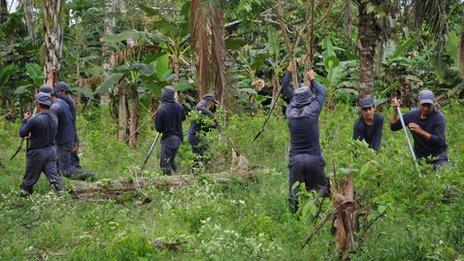
Coca crops have reportedly dropped as a result of eradication and crop replacement strategies
Colombia, one of the world's largest producers of cocaine, has seen the proportion of land planted with coca drop to a "historic low", sources in the Colombian security forces say.
Counter-narcotics experts say that soon-to-be-published United Nations figures will suggest that areas planted with coca, the raw ingredient for cocaine, decreased by 25% from 2011 to 2012.
Colombian Defence Minister Juan Carlos Pinzon said that, if confirmed, the figures showed "important progress" had been made in the fight against illicit drugs.
The annual report by the UN's Integrated Illicit Crops Monitoring System is expected to say that the land planted with coca bushes has dropped from 64,000 hectares in 2011 to less than 48,000 hectares in 2012, the lowest figure since monitoring started in Colombia over a decade ago.
Continuing battle
Mr Pinzon said the drop showed that "the sacrifice and the efforts made by the authorities over the last year were meaningful".
He said it was evident that the security forces "were harming the funding of terrorists' organisations and criminal gangs" who finance themselves through drug trafficking.
Colombia had long been the world's top producer of cocaine, but according to estimates released by White House drugs tsar Gil Kerlikowske last year, it fell behind Peru and Bolivia in 2011.
Mr Pinzon said the Colombian government would continue its broad strategy of encouraging coca growers to switch to legal crops, as well as going after drug dealers and money launderers engaged in the trafficking of cocaine.
In a wide-ranging interview with the BBC in London, Mr Pinzon said that the security forces had also weakened Colombia's largest rebel group, the Farc.
He said dozens of the guerrilla group's leaders had been killed and that the government estimated the number of active Farc fighters was now below 8,000 - less than half that at its height in 2000.
Mr Pinzon defended the government's decision to continue targeting the rebels as the two sides began peace negotiations in Cuba last November.
Some international observers, including the Representative of the UN High Commissioner for Human Rights in Colombia, Todd Howland, had urged the government to declare a ceasefire for the duration of the talks.
But Mr Pinzon said that the security forces could not be expected to stand by while the left-wing guerrillas continued to engage in "criminal activities" such as illegal mining, drug trafficking and the forced recruitment of children.
However, he stressed that the door would be open to any rebel willing to down arms.
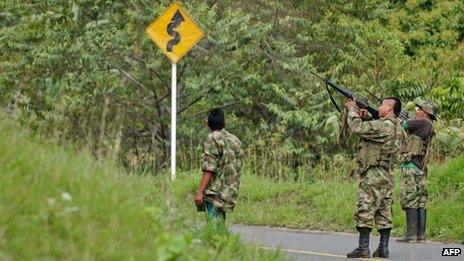
Farc rebels and government forces are continuing to battle each other despite being engaged in peace negotiations
"Anyone who is there [with the rebels] can demobilise tomorrow and will be very well accepted into society and by the armed forces," he said.
Mr Pinzon did say, however, that no former rebels would be allowed to join the armed forces or the police, or be allowed to carry arms.
He also said that Colombia would not engage in peace talks with the country's second largest rebel group, the National Liberation Army (ELN), while its members continued kidnapping people.
The ELN leadership has released a series of statements on its website over the past months saying it is ready for "a political exit from the conflict", prompting some commentators to question the government's decision to rebuff them.
Asked if there was not a danger that demobilised rebels may join one of the dozens of criminal gangs that have become a growing security concern in Colombia, he said the "Colombian authorities would have to confront the changing threats we see" and that the security forces would "keep going after any criminal activity which is around in current or future scenarios".
Peace talks between the Farc rebels and government negotiators are due to resume on Monday 1 July after a one-week break.
- Published27 May 2013
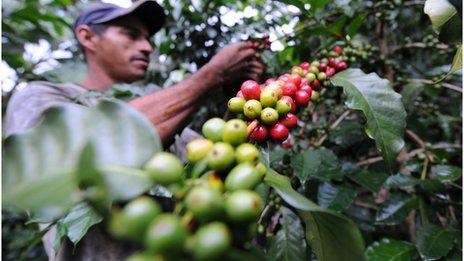
- Published7 February 2013
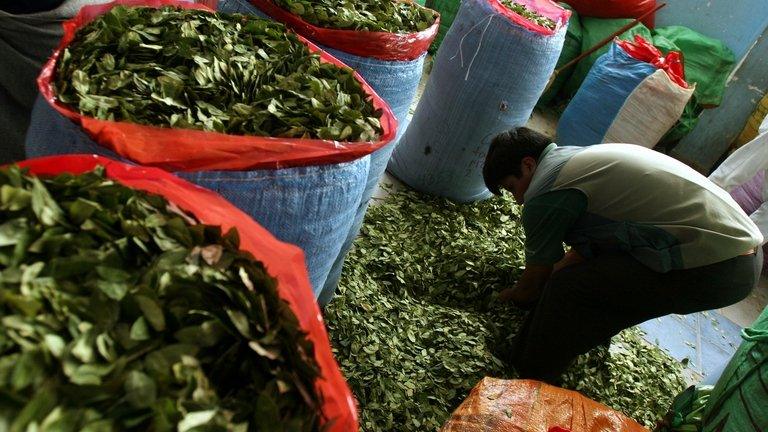
- Published23 April 2012
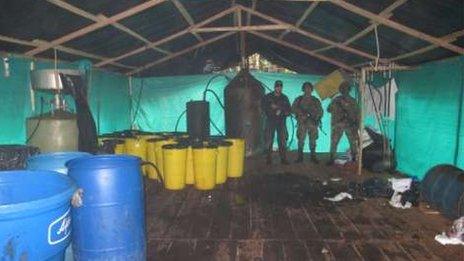
- Published8 August 2018